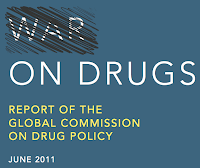Reports criticizing the War on Drugs are manifold but few carry the cachet of the Report of the Global Commission on Drug Policy. Issued this month, the report commissioners are a uniquely prestigious group that include the former presidents of Brazil, Colombia, Mexico and Switzerland; a former U.S. Secretary of State under Presidents Reagan and Nixon; a former Secretary General of the UN; a former Canadian Supreme Court Justice; a former chairman of the U.S. Federal Reserve; one of Britain’s most successful corporate leaders, and so on.
The conclusions of the report are unequivocal. The Executive Summary begins, “The global war on drugs has failed, with devastating consequences for individuals and societies around the world.” Can’t get much clearer than that. The summary goes on to say, “Government expenditures on futile supply reduction strategies and incarceration displace more cost-effective and evidence-based investments in demand and harm reduction.”
 The report shows that in the ten years 1998-2008, opiate use increased 34.5 per cent, cocaine use 27 per cent and cannabis use 8.5 per cent. Drugs, it seems, are winning the war.
The report shows that in the ten years 1998-2008, opiate use increased 34.5 per cent, cocaine use 27 per cent and cannabis use 8.5 per cent. Drugs, it seems, are winning the war.
Recommendations include, ” End the criminalization, marginalization and stigmatization of people who use drugs but who do no harm to others. … Encourage experimentation by governments with models of legal regulation of drugs to undermine the power of organized crime … Offer health and treatment services to those in need. … Eschew simplistic “just say no” messages and “zero tolerance” policies in favor of educational efforts grounded in credible information … Replace drug policies and strategies driven by ideology and political convenience with fiscally responsible policies and strategies grounded in science, health, security and human rights – and adopt appropriate criteria for their evaluation. … Break the taboo on debate and reform.”
The report specifically refers to “heroin-assisted treatment programs that have proven successful in many European countries and Canada.”
Unfortunately, our government’s approach—tougher laws, more imprisonment and shutting down heroin-assisted treatment programs—would seem to contradict just about everything in the report. If our government is not sensitive to the human cost of its approach, we might expect it to at least be sensitive to the economic cost. As British businessman Richard Branson, one of the commissioners, remarked, “It’s estimated that over one trillion have been spent on fighting this unwinnable battle. The irony is that a regulated market—one that is tightly controlled, one that would offer support not prison to those with drug problems—would cost tax payers much less money.” That should be music to Conservative ears.
The report is a good read with a thorough analysis of the state of the drug war, including the results of decriminalization initiatives, and solid recommendations for a more constructive, one might say saner, approach. I sincerely hope our governments reads it.
